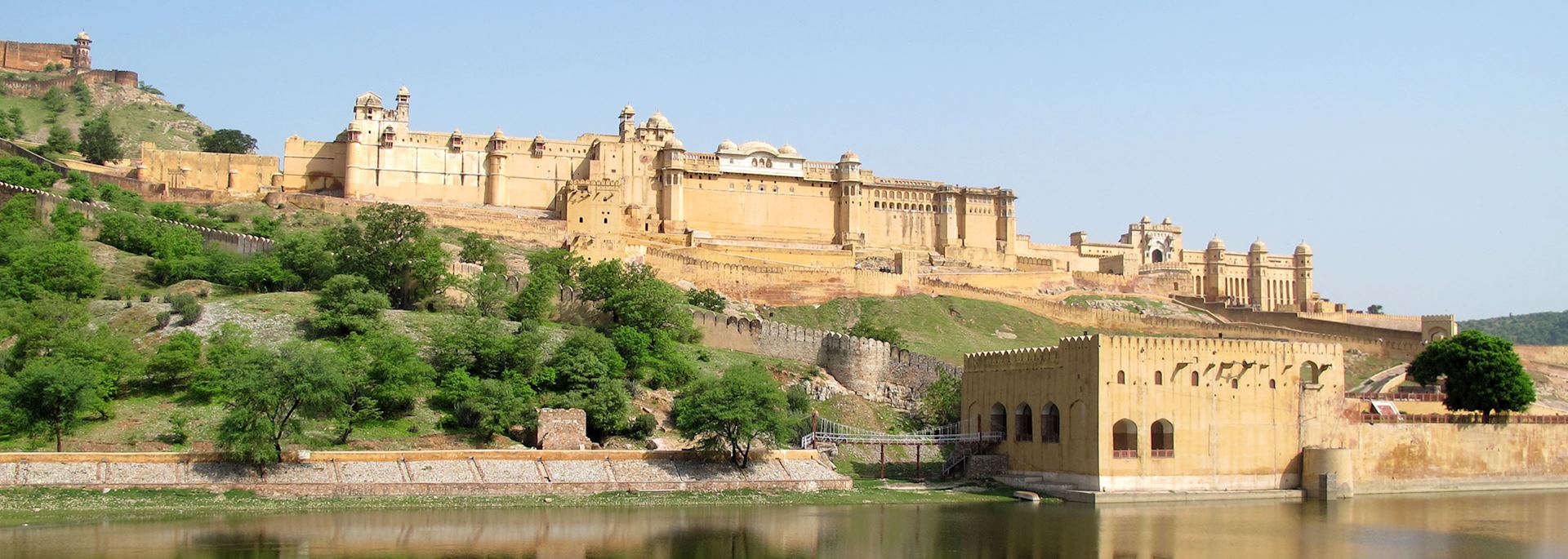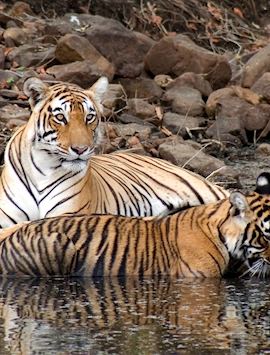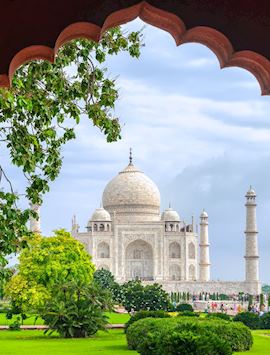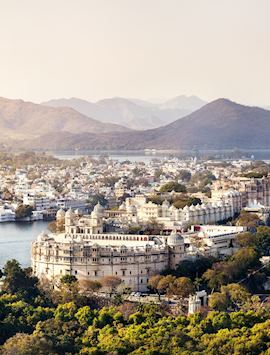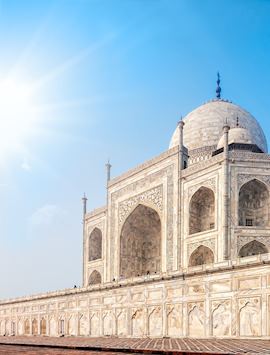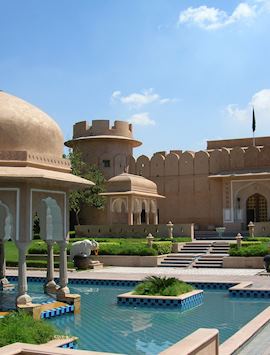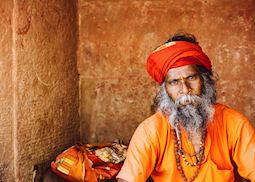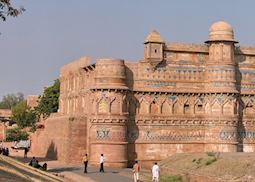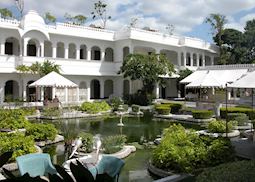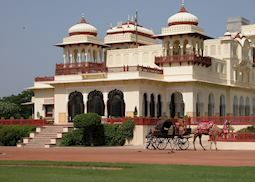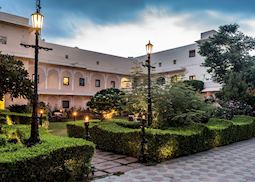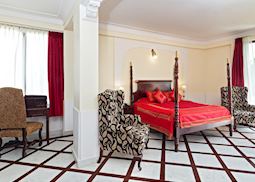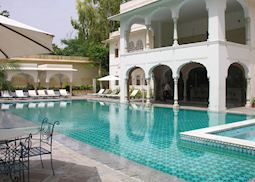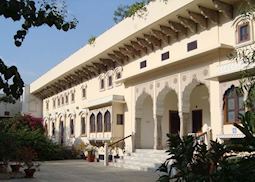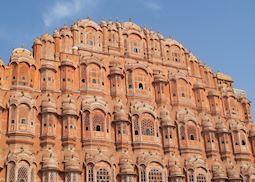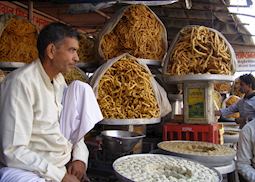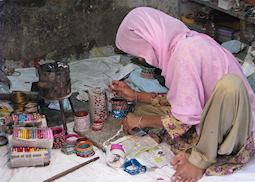Jump to:
Translated from Hindi, Rajasthan means ‘the land of kings’, and its capital, Jaipur, is defined by royalty. The 18th-century Maharaja Jai Singh designed the city to meet his every whim, with royal palaces, gardens and pavilions taking up almost a quarter of its footprint. Streets were designed as parade routes and a busy craft bazaar flourished, selling wares almost exclusively to decorate royal buildings.
Jaipur has retained its flair for royal celebration: the entire city was painted pink in 1876 to welcome the Prince of Wales (it was refreshed to celebrate the visit of Queen Elizabeth II and, later, Diana, Princess of Wales.) Today, Jaipur’s prolific royal architecture is fiercely protected. It’s worth slipping into the side streets too: you’ll find the artisans, traders and shopkeepers who keep the city ticking.
India specialist JamesFor me, Jaipur is one of the most vibrant cities in Rajasthan. Not only can you explore the Pink City and the Amber Fort, but there’s the opportunity to stay in a traditional heritage haveli.
Things to see and do in Jaipur
Walk the streets of Jaipur’s Old Bazaars
Every surface of Jaipur’s 18th-century City Palace is adorned with carvings, silverwork or opulent textiles. The majority of the decoration was created in Jaipur’s Old Bazaars, and similar pieces of work are still made there today, the traditional techniques unchanged. Delve into some of the oldest streets of Jaipur with a local guide, and you can see the craftsmen at work. Zardozi embroidery, intricate designs created with gold and silver thread, is a particular speciality of the region.
There’s also the chance to sample some of the area’s culinary delights — popular with local shoppers and the artisans themselves. Your guide will introduce you to some of the most well regarded street food vendors, inviting you to try dishes such as freshly fried aloo tikki (potato cakes) and samosas. The desserts are as lavish as some of the craftwork, particularly the displays of barfi (a cashew nut and milk sweet) covered in edible silver leaf.
Cook with a local family
The Mandawa family have converted their ancestral home, DeraMandawa, into a welcoming heritage hotel where you can spend time in a traditional Rajasthan family setting. Most of the family still live here, inviting guests to attend their private temple for puja (prayers) each evening. Taking a cooking lesson with your hosts will help you to re-create some regional dishes back home.
Lessons begin with a visit to the nearby local market to learn how the spices, on display in towering pyramids, are prepared and blended in cooking to give a delicate balance of tastes. Back in the kitchen, you’ll help prepare a variety of dishes including Aamras ki Kadhi, a bright yellow Rajasthan speciality of blended mango and spices. You’ll dine together with the family, trying out your creations alongside a selection of homemade chutneys and pickles.
Learn block printing at Bagru
Traditionally, artisan villages in Rajasthan focus on one industry or skill, their inhabitants collectively sharing their expertise, materials and trade opportunities. The village of Bagru, a 40-minute drive from Jaipur, is no different, renowned for its intricately block-printed textiles. On a tour with a local guide, you’ll be taught the printing, washing and dyeing process.
Arriving in the village, you’ll notice immediately the great swathes of fabric drying in the sun. Logs of teak are finely carved into printing blocks while natural dyes are mixed in preparation — turmeric for yellow and madder root for red. The hand-printing process itself is a precise skill, the artists honing rhythmical movements to create the same pattern over long tables of fabric. Keen to share their skills, the printers will welcome you to try some of the printing techniques.
Take a guided tour of Jaipur’s Mughal treasures
The ruling family of Jaipur, led by Maharaja Jai Singh, carefully planned their 18th-century city, designing wide boulevards, a centrally positioned palace and temples.
A revolutionary addition was the Jantar Mantar, an observatory complex. You’ll need an experienced guide to talk you through the array of large-scale instruments, which includes the largest sundial ever built. Made from brick and smooth plaster, their crisp, sculptural geometric shapes look decidedly modern.
The Hawa Mahal, or Palace of the Winds, was built alongside the main road into the city, allowing the royal women to observe parades entering Jaipur unseen behind latticed screens. While it’s possible to enter the palace, you’ll find it’s a one-room-deep façade.
The City Palace, to the east of the modern city, houses a textile museum that celebrates the region’s rich artisanal skills, as well as an armory and art gallery.
Visit Amber Fort
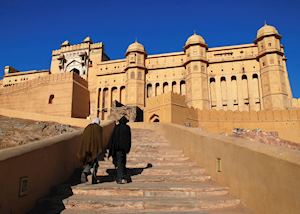 Rajasthan’s original capital was Amber, which sits 11 km (7 miles) from Jaipur. The seat of power was moved to its present location in 1727 due to Amber’s dwindling water supplies, but Amber Fort still stands guard up in the Aravalli Hills.
Rajasthan’s original capital was Amber, which sits 11 km (7 miles) from Jaipur. The seat of power was moved to its present location in 1727 due to Amber’s dwindling water supplies, but Amber Fort still stands guard up in the Aravalli Hills.
The best way to get to the palace is by walking up, zig-zagging past market stalls and street vendors, arriving into the main courtyard through the Suraju Pole (sun gate). Women of the royal court were banned from the courtyard, but allowed to watch the goings-on from veiled windows above. You may see decorated elephants carrying visitors to the top but, as many welfare aspects are unknown, we prefer not to recommend this method.
A labyrinth of corridors, galleries, temples and royal quarters surrounds three further courtyards. The Sheesh Mahal (meaning ‘mirror palace’) is the most ornate room, covered in thousands of mirrors and semi-precious stones; light a single candle and the entire room is illuminated. The fortified final courtyard, the zenana, was the private quarters of the Maharaja’s wives and concubines.
Best time to visit Jaipur
Generally, Jaipur enjoys warm, dry and sunny weather from October to March. The temperatures drop in December and January, with mist and fog gracing the early mornings. If you’re happy with a more humid climate, hotels offer good-value rates for April and May. From June, temperatures creep up to 113°F (45°C), making travel uncomfortable.
Festivals, events and seasonal reasons to visit
- The Hindu festival of Holi is celebrated enthusiastically in March. Marking the coming of spring, paint is thrown during vibrant street parties. If you’re unsure about taking part, it’s possible to watch the spectacle from one of Jaipur’s rooftop restaurants.
- Diwali, the Hindu festival of light, occurs in late October or early November. Thousands of oil lamps are lit across Jaipur as families meet to exchange gifts. Most sites are closed, but the evenings bring light shows of fireworks and bonfires.
- The Jaipur Literature Festival takes place toward the end of January each year. Attracting Nobel laureates as well as local writers, it offers a varied program of events including talks and readings.
who's been there
-
617-223-4521617-223-4195
- Make an inquiry
Suggested itineraries featuring Jaipur
Our itineraries will give you suggestions for what is possible when you travel in Jaipur, and they showcase routes we know work particularly well. Treat them as inspiration, because your trip will be created uniquely by one of our specialists.
Places near Jaipur
- Samode 20 miles away
- Ramathra 74 miles away
- Ranthambhore National Park 76 miles away
- Pushkar 84 miles away
- Barli 96 miles away
- Bundi 103 miles away
- Bharatpur and Keoladeo Ghana National Park 105 miles away
- Shahpura 106 miles away
- Fatehpur Sikri 114 miles away
- Nimaj 125 miles away
- Chhatra Sagar 125 miles away
- Nagaur 130 miles away
- Agra 136 miles away
- Bhainsrorgarh 136 miles away
- Delhi 147 miles away
- Deogarh 153 miles away
- Gwalior 153 miles away
- Chittorgarh 159 miles away
- Chambal Sanctuary 169 miles away
- Bikaner 172 miles away
- Jodhpur 178 miles away
- Rohet 179 miles away
- Narlai 181 miles away
- Kumbhalgarh 186 miles away
- Devigarh 190 miles away
- Chanoud 193 miles away
- Orchha 206 miles away
- Udaipur 210 miles away
- Pokaran 242 miles away
- Dungarpur 250 miles away
- Mount Abu 252 miles away
- Haridwar 253 miles away
- Corbett Tiger Reserve 261 miles away
- Rishikesh 268 miles away
- Nainital 281 miles away
- Mussoorie 281 miles away
- Khajuraho 293 miles away
- Almora 299 miles away
Photos of Jaipur
Our expert guides to exploring Jaipur
Written by our specialists from their own experiences of visiting Jaipur, these guides will help you make the most of your time there. We share both our practical recommendations and the best ways to appreciate Jaipur at its best.
-
What to do in India: our highlights guide ![Sadhu in Varanasi]()
What to do in India: our highlights guide
What to do in India: our highlights guide
Our India specialists pick some of their best things to see and do, and where to stay from the Himalaya to Kerala. Include spotting tiger, staying in a palace in Rajasthan, taking a boat trip down the Ganges and experience one of the country’s many festivals in your trip to India.
Read this guide -
Touring India’s Golden Triangle ![Hawa Mahal in Jaipur]()
Touring India’s Golden Triangle
Touring India’s Golden Triangle
The Taj Mahal is just one of many impressive sights on a tour of India’s Golden Triangle. For first-time visitors, the region offers a tempting taste of the vast range of cultures, historical sites, architecture, religion, food and landscapes that India boasts.
Read this guide -
The best of Rajasthan: why stay in an Indian fort ![Gwalior Fort]()
The best of Rajasthan: why stay in an Indian fort
The best of Rajasthan: why stay in an Indian fort
Rajasthan is often defined by its range of towering stone fortresses. Here, India specialist Lydia leads you on a tour of the smaller forts that you can spend a night in, and picks out four of the best.
Read this guide -
Palaces and regal stays in India ![Lake Palace Hotel, Udaipur]()
Palaces and regal stays in India
Palaces and regal stays in India
Private butlers, priceless chandeliers, and gilded furniture: life as an Indian royal was the epitome of opulence. With many royal residences now palatial hotels, you can taste life as a maharaja or maharani. We’ve chosen the best regal experiences from Rajasthan to Varanasi.
Read this guide
Accommodation choices for Jaipur
We've selected a range of accommodation options for when you visit Jaipur. Our choices usually come recommended for their character, facilities and service or location. Our specialists always aim to suggest properties that match your preferences.
-
![Rajvilas, Jaipur]()
The Oberoi Rajvilas
Jaipur -
![Rambagh Palace, Jaipur]()
Rambagh Palace
Jaipur -
![Royal Heritage Haveli, Jaipur]()
Royal Heritage Haveli
Jaipur -
![Deluxe room]()
Dera Rawatsar
Jaipur -
![Pool at Samode Haveli, Jaipur]()
Samode Haveli
Jaipur -
![DeraMandawa]()
DeraMandawa
Jaipur
Ideas for experiencing Jaipur
Our specialists seek out authentic ways to get to know the places that could feature in your trip. These activities reflect some of the experiences they've most enjoyed while visiting Jaipur, and which use the best local guides.
-
Half day excursion of the Amber Fort Palace ![Amber Fort, Jaipur]()
Half day excursion of the Amber Fort Palace
Half day excursion of the Amber Fort Palace
Within Jaipur there are a number of interesting sights, including Amber Fort on the rugged ridge of the Aravalli hills, overlooking a large lake.
View details -
Half day city tour of Jaipur ![Hawa Mahal, Jaipur]()
Half day city tour of Jaipur
Half day city tour of Jaipur
A half-day tour of the city of Jaipur, visiting some of its most popular sights.
View details -
Evening bazaar, crafts and cuisine in Jaipur ![Indian sweets for sale in Amber village]()
Evening bazaar, crafts and cuisine in Jaipur
Evening bazaar, crafts and cuisine in Jaipur
Jaipur is widely considered by many as the craft capital of India. You will see busy craftsman in their workshops on this guided walk, sample culinary delights and mingle with the locals.
View details -
The Old Bazaars of Jaipur ![Bangles being made out of lac at Maniharon ka Rasta]()
The Old Bazaars of Jaipur
The Old Bazaars of Jaipur
You will be able to see craftsman working on some fine forms of local art like Zardozi embroidery, Gota work, Kinari, silver ornament work, and precious and semi-precious stonework, all taking place in these old bazaars of Jaipur.
View details
